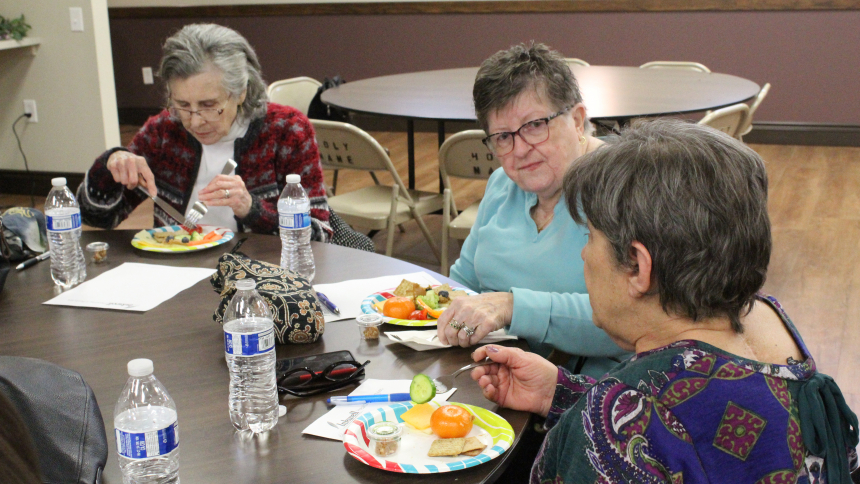
CEDAR LAKE – Most new year’s resolutions have already been broken, according to statistics, but for those who have pledged to get physically healthier, the Health and Safety Ministry at Holy Name of Jesus offered some help on Jan. 29 in the form of a Nutrition Workshop focusing on diet, exercise and sleep habits.
“About 45% of Americans have a health goal for the new year, and they start out excited but then that enthusiasm fades by the end of January and only 9-12% are successful in meeting their goal by the end of the year,” said Carol Slager, a pharmacist and certified health coach who focused on encouraging her audience to make small changes as they work toward a bigger goal.
“I teach people how to enjoy long-lasting health benefits without giving up everything they enjoy (eating and doing),” explained Slager, author of a book about lactose intolerance who also writes a blog and has a website addressing healthy lifestyle habits. “Everyone is different. The key is to find out what’s right for you.
“Take a step that takes you a little closer (to your goal),” Slager urged. Just as you move forward spiritually by doing little things to get closer to God, she suggested, “You can move forward physically one step at a time. You don’t have to go all the way at the beginning (of your journey).”
At a restaurant, “Don’t feel you have to eat everything on your plate – even if you were taught that as a kid – and instead take some food home for lunch the next day,” Slager said. “When cooking at home, save some leftovers for tomorrow. Learn to realize when you are 80% full and stop eating.”
Slager also urged her audience to take their time when dining. “We need to slow down our eating; don’t eat and run. If you ate fast as a child, that likely became a habit, so you need to make an effort to eat slower,” she said.
In answer to a question about how much water a person should drink, Slager suggested a person should divide their weight by two and drink the same number of ounces of water a day, again taking it slowly. “Little things add up, so start by drinking a little less coffee and more water with lemon each day, and work your way up.”
Caffeinated beverages, coffee, tea, flavor packets and soda pop, are not substitutes for water, but decaffeinated herbal tea and broth can be. “If you don’t like plain water, add citrus fruit or a bit of raw honey or maple syrup to sweeten it,” she suggested.
Fresh and flash-frozen fruits and vegetables are the best meal choices, while meat often has a lot of hormones that should be avoided. “Learn to read labels on foods – the best food is a whole food when you know what it is – like a banana or an avocado. An apple is best, unsweetened applesauce is okay, but apple juice is not good with all the additives. Besides, chewing food is more satisfying,” Slager noted.
“No one ever gained too much weight (by) eating vegetables,” said Slager. “Even if you have to squeeze a lemon on it or drizzle a little raw honey, it’s worth it.”
When it comes to protein, chicken, beef and other meats can be loaded with hormones, so using a portion control guide can be helpful,” said Slager, who compared Omega 3 fats (wild caught fish, plants, roasted or sauteed vegetables) with Omega 6 fatty acids (corn-fed beef, chicken) and urged her audience to try to balance the two.
A good rule of thumb is for a woman to use the palm of her hand to measure one portion of protein while a man can consume the equivalent of two palms. “I know, ladies, it’s not fair,” Slager added.
A frequent subject of her blog, added Slager, is her husband, who she calls “Mr. Non-compliant” for his poor diet choices. When he eats a doughnut, she explained, “It’s okay if it is an amazing doughnut and he enjoys every bite; then it is worth it. But if you take a bite and the doughnut is dry, you don’t have to finish it.”
Slager also urged her audience to get 7-8 hours of sleep each night, noting that sleep can affect heart health, blood pressure, sugar levels and other physical conditions. “If you feel you can’t do that much, again take it slow,” she advised. “Try going to bed 10 minutes earlier, then add five minutes a day until you’ve added an extra hour. A lot of people say to avoid electronics before bed, too, and that when the room is very dark, you can sleep better. Also, get the bedroom cooler and it helps.”
When it comes to exercise, Slager said any movement is a positive, including walking or chair exercises.
“Just start by doing small things, and the change can be big,” Slager urged.
Another way to control the amount and type of diet is to subscribe to a meal plan, described by workshop speaker Jeremy Bowen, a former schoolteacher who lost a considerable amount of weight and recently opened a Crown Point business, Project LeanNation, that offers prepared meals. He touted lifestyle coaching and a supportive community that has grown from 150 founding members to 252 in less than a month.
“We work with people to help them reach their goals and eat healthier,” he said.
Sandy Berenc, who attended the workshop with her husband, John Berenc, said she found an earlier parish workshop on safety tips “very informative. That’s why we decided to attend this workshop; I’m always going to learn something new and helpful.”



